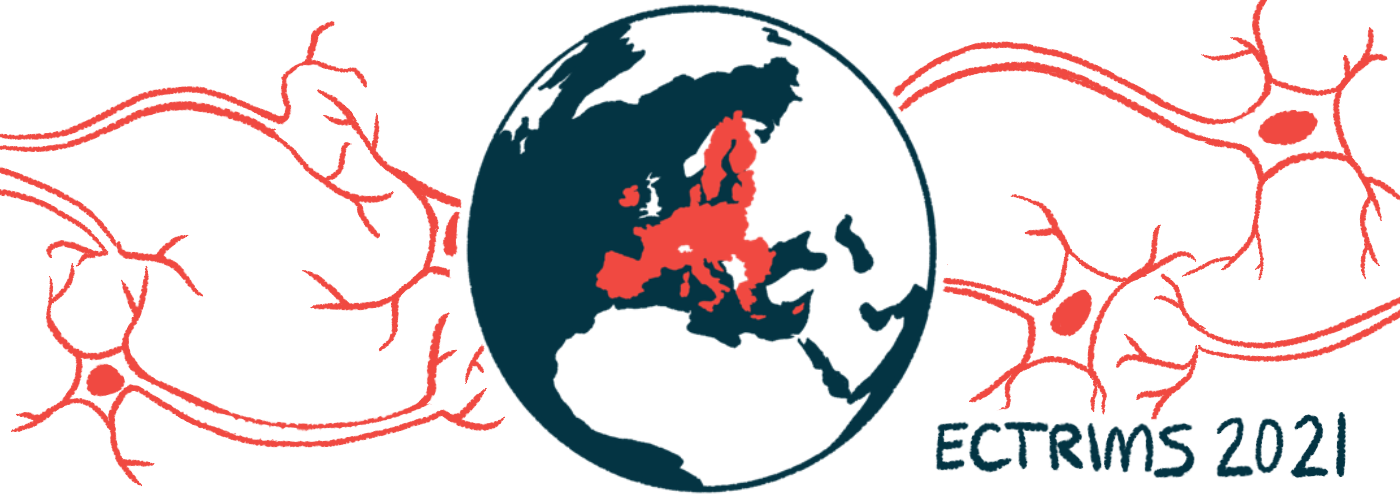#ECTRIMS2021 – Stem Cell Transplant May Better Treat SPMS Than DMTs
Written by Marta Figueiredo, PhD |

A patient-derived stem cell transplant is more effective than available disease-modifying therapies (DMTs) at slowing disease progression in people with active secondary progressive multiple sclerosis (SPMS), according to a real-life study in Italy.
Data highlight the potential benefits of this therapeutic approach in SPMS patients, and support its further evaluation in future, appropriately controlled clinical trials, the researchers noted.
These findings were shared by Giacomo Boffa, MD, of the University of Genova, at the 37th Congress of the European Committee for Treatment and Research in Multiple Sclerosis (ECTRIMS), running virtually through Oct. 15.
The oral presentation was titled, “Autologous hematopoietic stem cell transplantation reduces disability progression in patients with secondary progressive multiple sclerosis: results from the Italian MS Register.”
An autologous hematopoietic stem cell transplant (AHSCT) is an intensive, experimental way of treating MS that is meant to stop the disease’s abnormal immune attacks and inflammation on the brain and spinal cord by resetting a patient’s immune system.
The procedure begins with the collection of a person’s healthy blood cell progenitors, also known as hematopoietic stem cells, from the bone marrow. These cells are then infused back to the patient after a fairly aggressive chemotherapy regimen is given to kill their immune cells.
By allowing a full reset of the body’s immune system, AHSCT has the potential to significantly slow or halt MS progression.
Several previous studies suggest that this approach is effective — and more so than some DMTs — in people with relapsing forms of MS. But evidence is limited regarding its effects with SPMS.
Boffa and colleagues at other Italian universities evaluated the efficacy of AHSCT against DMTs at slowing disease progression in people with active SPMS, or a disease with signs of inflammatory activity. Of note, most available DMTs for MS suppress, in one way or another, the immune system.
The study included 69 SPMS patients who received AHSCT (AHSCT group) within the Italian Bone Marrow Transplantation Study Group, and 217 matched patients using DMTs (DMT group) and who were participating in the Italian MS Register. The mean age was about 38.
Its main goal was to compare patients’ disability worsening as assessed with the Expanded Disability Status Scale (EDSS), in which higher scores indicate greater disability.
Secondary goals included the proportion of patients with six-month confirmed disability progression, six-month confirmed disability improvement (lessening), and patients with an improved status relative to study’s start.
After a mean follow-up of 5.2 years, results showed that the stem cell transplant was associated with a significantly slower disease progression compared with approved DMTs.
Particularly, the AHSCT group exhibited generally sable disability scores over time, “while patients treated with other DMTs had a continuous disability progression,” Boffa said.
In addition, the stem cell transplant significantly delayed the time to confirmed disability progression relative to other DMTs, with 62% of AHSCT-treated patients remaining free of disability progression at five years.
Patients receiving AHSCT were also four times more likely to achieve confirmed disability improvement relative to those given DMTs. Notably, five years after the procedure, “20% of patients still maintained disability improvement, compared with only 4% of patients treated with other DMTs,” Boffa said.
These finding suggest that stem cell transplant is superior to DMTs at slowing disability progression in people with active SPMS.
“The possibility to improve in disability and maintain improvement is a crucial need for patients with a progressive disease and it’s hardly obtained with standard anti-inflammatory drugs,” Boffa said.
He noted, however, that these results may not be applicable to SPMS patients without signs of inflammatory activity (active disease). Still, they “reinforce the notion that ongoing inflammation during progressive MS requires adequate immunotherapy.”
Future controlled clinical trials “are needed to confirm the efficacy of AHSCT in patients with active SPMS,” the researchers wrote.
A Phase 3 trial called BEAT-MS (NCT04047628) is evaluating the safety, effectiveness, and cost-effectiveness of AHSCT against available, third-line DMTs in up to 156 people with severe forms of relapsing MS.
The study is currently enrolling eligible patients at sites across the U.S., and is expected to open at a single U.K. site; more information is available here.
About the Author
Marta Figueiredo, PhD Marta holds a biology degree, a master’s in evolutionary and developmental biology, and a PhD in biomedical sciences from the University of Lisbon, Portugal. She was awarded a research scholarship and a PhD scholarship, and her research focused on the role of several signaling pathways in thymus and parathyroid glands embryonic development. She also previously worked as an assistant professor of an annual one-week embryology course at the University of Lisbon’s Faculty of Medicine.Subscribe to our newsletter
Get regular updates to your inbox.
Log in
Don't have an account?
Log in
|
Register
Already have an account?
Register
Create your account by filling in the information below:
By creating an account, you are agreeing to the Privacy Policy and Terms of Service.
